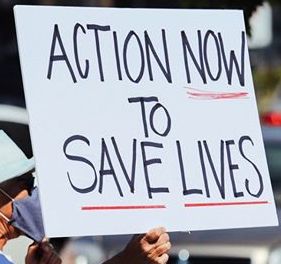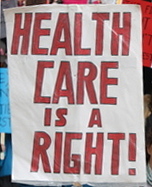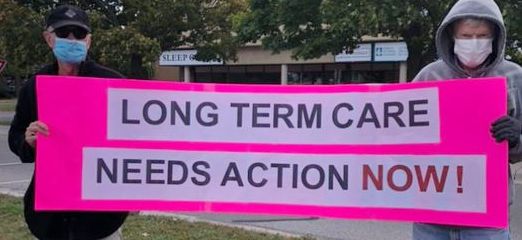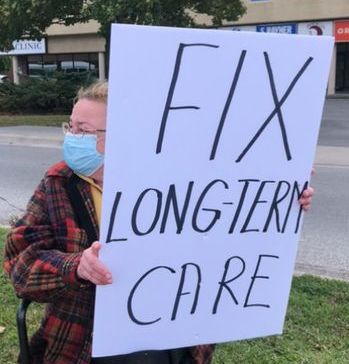April 26, 2021 - No.
33
April
28 - National Day of Mourning
Health and Seniors Care
Workers
Speak About Their Concerns
  
• Vicki McKenna,
President, Ontario Nurses Association
• Natasha Lisun,
President, Local 8, Canadian Union of Public Employees, Calgary • Rhonda
Bruce, Rehabilitation Assistant and Regional Vice President, BC
Interior, Hospital Employees Union
Health and
Seniors Care Workers Speak About Their Concerns
The COVID-19 pandemic has
stretched registered nurse and health care professionals beyond what
was thought
possible. Ontario Nurses' Association (ONA) members are suffering
record levels of burn out, fatigue and are increasingly experiencing
moral and emotional distress from the demands on them and what they
have witnessed their patients, residents and clients experience.
 ONA
has from the beginning taken every action possible to advocate for
members' health and safety. ONA raised the issue with the Province of
the spread in long-term care homes before a pandemic was declared.
Having learned the lessons of SARS -- that is, ensuring the
precautionary principle is used to keep patients and the staff who care
for them safe -- ONA has been unrelenting in its fight for protections.
At times, when negotiations with government were not successful, ONA
has turned to the courts -- successfully -- to force for-profit
long-term care homes to equip their staff with personal protective
equipment. ONA
has from the beginning taken every action possible to advocate for
members' health and safety. ONA raised the issue with the Province of
the spread in long-term care homes before a pandemic was declared.
Having learned the lessons of SARS -- that is, ensuring the
precautionary principle is used to keep patients and the staff who care
for them safe -- ONA has been unrelenting in its fight for protections.
At times, when negotiations with government were not successful, ONA
has turned to the courts -- successfully -- to force for-profit
long-term care homes to equip their staff with personal protective
equipment.
As mental health in Ontarians and among
health care workers
declines, nurses can turn to the Nurses' Health Program developed in
conjunction with other nursing organizations. ONA notes that the
Canadian Federation of Nurses Unions has resources available as well.
Sadly, the calls of ONA and its members for measures to
address
the nursing shortage and improve long-term care have been ignored,
and the result has been made clear during the pandemic. If there is
anything good to come from COVID-19, nurses hope that it will be
improvements in Registered Nurse staffing levels, long-term care and
a bolstering of our public health system. The pandemic has shown more
clearly than ever that nurses remain the backbone of our health care
system. 

Local 8
represents more than 2,000 members
at 17 different seniors' care sites in Calgary and surrounding areas,
each with its own bargaining unit. The sites include all forms of
seniors' congregate living in Alberta, from long-term care homes and
designated assisted-living to lodges and retirement homes.
"The biggest issues within our bargaining units are staffing
levels
and paid sick time. A lot of our bargaining units are still
short-staffed. The workers are overworked, they often don't take their
breaks, they do not get adequate vacation time, and time to relax and
not concentrate on work. This is especially true during outbreaks. New
hires are
not staying around long because of the work load, and the additional
work on top of regular duties, for example continuous mandated cleaning
that falls not only on housekeeping but also health care aides.
Sick time is another major problem. Many workers do have sick
time
in our collective agreements, but many have exhausted their sick time
because of outbreaks and having to isolate. In some cases they are paid
when they are isolating, but in other cases they are not. Rapid testing
has been introduced in a lot of long-term care and retirement
homes. When a worker tests positive in a rapid test and then it turns
out to be a false positive, they may not be paid for the days at home
waiting for the second test. Some employers have agreed to pay for this
time on a case by case basis, but others have not. Many
employers have attendance management programs where workers can
be given written warnings for taking above average time off, so our
members are feeling they have to go to work, to show that they tried.
So they face loss of income and possible reprimand for calling in sick
while public health guidelines say stay home if you feel
ill. We are in negotiations with many of our
bargaining units right now,
and we are pushing for paid sick leave and have achieved some increases
in sick leave. Another thing that has had a big
impact is the single site staffing
orders which have negatively affected as many as 20 per cent of our
members, resulting in lost income. At the beginning of the pandemic,
they received top-up hours but these were never guaranteed and provided
only if additional hours are available. It has been more than a year
now and the concerns about the single staff order remain and haven't
been resolved.  The
single site has so many flaws, and the attempts to correct it went
nowhere despite all our efforts. The policy was also flawed in
containing the spread of COVID-19 from one site to another because it
does not cover all workplaces. It only applies to sites with long-term
care or designated supportive living beds. So you can't work in two
long-term care homes, but anyone working in a hospital, retirement
residence or lodge setting can also work in long-term care or
designated supportive living. The
single site has so many flaws, and the attempts to correct it went
nowhere despite all our efforts. The policy was also flawed in
containing the spread of COVID-19 from one site to another because it
does not cover all workplaces. It only applies to sites with long-term
care or designated supportive living beds. So you can't work in two
long-term care homes, but anyone working in a hospital, retirement
residence or lodge setting can also work in long-term care or
designated supportive living.
Workers who
had to choose an employer
were given priority for additional hours, but they were not guaranteed.
Some of our members worked two full-time jobs and went down to one, or
lost all their hours in excess of one full-time equivalency (FTE). We
need adequate pay now and in the future so workers do not have to work
multiple jobs just to make ends meet. As far as PPE
is concerned, since last summer most of our demands have been met; we
were very active in advocating on that. There could be a
better supply of N95 masks, but everyone who is in direct care with
COVID-19-positive patients is getting N95 masks. Although
vaccine has been offered to most of our members by now,
government has not stepped in to provide information about vaccines to
those who have concerns, for example whether vaccine is safe for women
who are pregnant or trying to get pregnant. Workers are left to search
for information themselves. The government needs
to step up and clearly communicate to health care workers and address
their concerns. What do we need going forward? Some
of the wages are really low in
the private system, and for the public system the government is
demanding wage cuts. If workers had higher FTEs, more full-time work,
paid sick leave for all, and better wages it would be a huge
improvement for our members and the residents they care for.

When the pandemic hit, all
long-term care
(LTC) sites had to have a COVID-19 safety plan. I am an Occupational
Health and Safety Officer and I reviewed the plan with our manager. We
thought our COVID-19 safety measures were adequate and we had no
outbreaks all last year, till Christmas.  The first
outbreak in our community was at the residence attached to
the hospital. They had no clear safety plan. When COVID-19 hit the
system was already running on overtime. There was not enough staff.
Every site was supposed to have a plan for bringing in extra staff as
part of their COVID-19 safety plan but it wasn't until about five
days into the outbreak that the Health Authority made a request for
more Registered Nurses (RNs) and Licensed Practical Nurses (LPNs). No
extra care aides, dietary or housekeeping staff were provided. The
problem is that RNs and LPNs only do hands-on care for complicated
cases. For most residents the hands-on care -- feeding, dressing,
bathing, toileting, mobilizing -- is done by Care Aides. Out of 59
residents, 53 tested positive and 22 died. At one point there was one
Care Aide on an overnight shift caring for 59 residents, many of whom
were sick. That worker is off work now from the stress and is not the
only one. The first
outbreak in our community was at the residence attached to
the hospital. They had no clear safety plan. When COVID-19 hit the
system was already running on overtime. There was not enough staff.
Every site was supposed to have a plan for bringing in extra staff as
part of their COVID-19 safety plan but it wasn't until about five
days into the outbreak that the Health Authority made a request for
more Registered Nurses (RNs) and Licensed Practical Nurses (LPNs). No
extra care aides, dietary or housekeeping staff were provided. The
problem is that RNs and LPNs only do hands-on care for complicated
cases. For most residents the hands-on care -- feeding, dressing,
bathing, toileting, mobilizing -- is done by Care Aides. Out of 59
residents, 53 tested positive and 22 died. At one point there was one
Care Aide on an overnight shift caring for 59 residents, many of whom
were sick. That worker is off work now from the stress and is not the
only one.
One activity worker, someone who
organizes outings, games, social
activities for residents, was re-assigned to do end-of-life calls with
family members, taking an i-pad to the bedside and connecting the
resident with the family in the last hours of their life. She crashed.
She said "my job as a recreation aide is to do the fun stuff,
activities and
games. I'm not trained for this." During the first outbreak the Care
Aides, on top of their regular duties, were assigned the work of
preparing the bodies of residents who died, work normally done by the
mortuary. That was really hard on them. An
outbreak was declared at my site on January 5. I was not worried
because we had our safety plan, but I have to say that nothing prepared
us for what we would have to do. On my wing there were 11 patients and
10 tested positive for COVID-19. We were instructed on proper donning
and doffing of PPE -- gowns, gloves, masks, goggles
-- which has to be done in a certain order and methodically. The
problem was that we were already short-staffed. Residents had to be
isolated and eat in their rooms, some needing extra care because they
had symptoms. Now every single time we entered a resident's room the
PPE routine added about 10 minutes. One Care Aide was looking after
11 residents, 10 of whom had tested positive. Just imagine, for meals,
it takes 20 minutes just to don and doff PPE to deliver and pick up the
tray, times 11 residents in isolation, over three hours per meal. It
was impossible. A big problem is that workers were
not involved by Infectious
Control in working out how to keep themselves and the residents safe.
Infectious Control came in and issued orders but the "how to" was never
discussed and we did not have enough staff. The first two weeks were
exhausting and we could not provide the care that people needed.
Once we finally had enough staff we could work calmly. There were no
contaminations after the increase in staff, people could take their
time, talk to the residents, spend some time with them. In
a COVID-19 outbreak you live with heightened anxiety all the
time. There is constant stress and concern for your residents who are
isolated in their rooms, away from family and all social contact except
with staff. There is constant fear of catching it, spreading it to
residents, to your own family. There was one
infectious control nurse for the south part of the
Health Authority at the time of the first outbreak. Now, after a second
outbreak, there are six. That took a year.  Another
thing that we needed was debriefs. We didn't have any until we pushed
for them. We needed them to deal with the stress and how that affects
us, especially workers with conditions like asthma, high blood
pressure, auto-immune conditions, complex family situations. We did our
best to help each other out, for instance we made sure
that one worker whose mother had cancer was assigned to work that kept
them away from direct contact with residents, things like that. I got a
debrief for my unit and it helped a lot. Debriefs are important for
workers dealing with trauma and are needed immediately and not months
later which is what has happened, if they happen at all. Another
thing that we needed was debriefs. We didn't have any until we pushed
for them. We needed them to deal with the stress and how that affects
us, especially workers with conditions like asthma, high blood
pressure, auto-immune conditions, complex family situations. We did our
best to help each other out, for instance we made sure
that one worker whose mother had cancer was assigned to work that kept
them away from direct contact with residents, things like that. I got a
debrief for my unit and it helped a lot. Debriefs are important for
workers dealing with trauma and are needed immediately and not months
later which is what has happened, if they happen at all.
We
are post-outbreak and on constant high alert. We have to make
sure we don't get complacent and are concerned about the variants.
Since about halfway through the outbreak we have had enough staff and
that has been maintained and has to be maintained after this is all
over.

(To
access articles individually click on the black headline.)
PDF
PREVIOUS
ISSUES | HOME
Website:
www.cpcml.ca
Email: office@cpcml.ca | 
